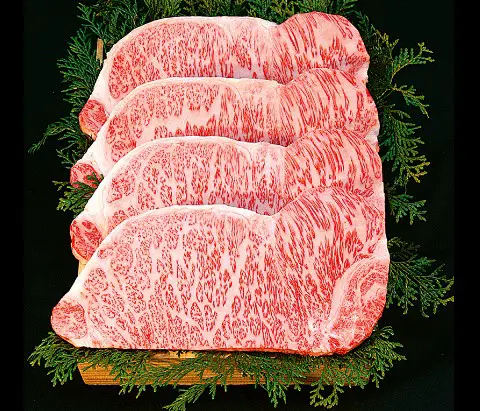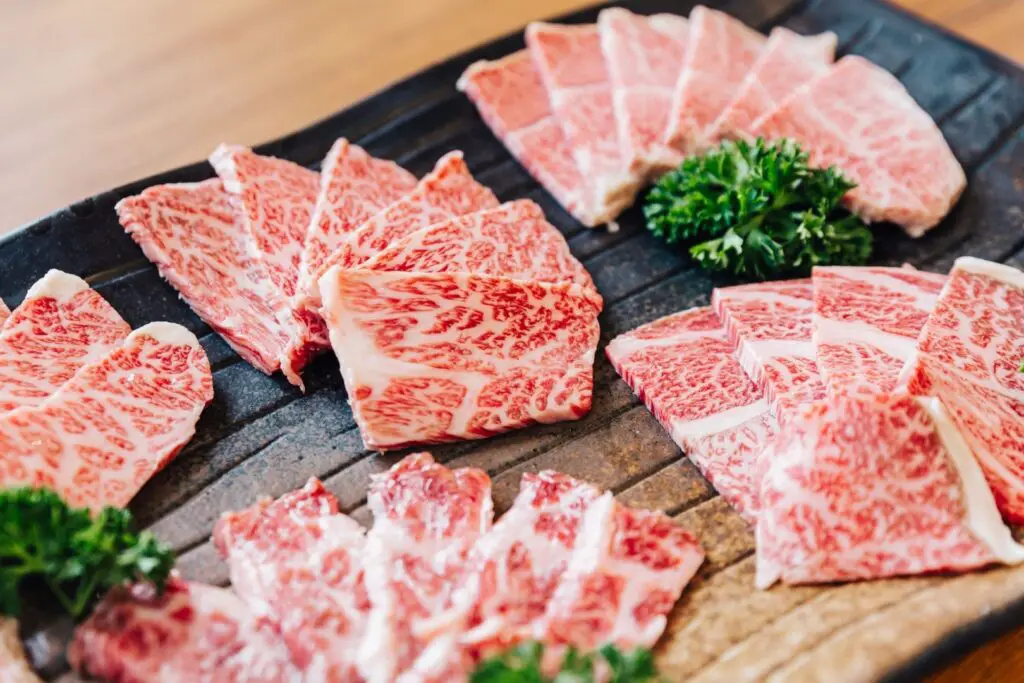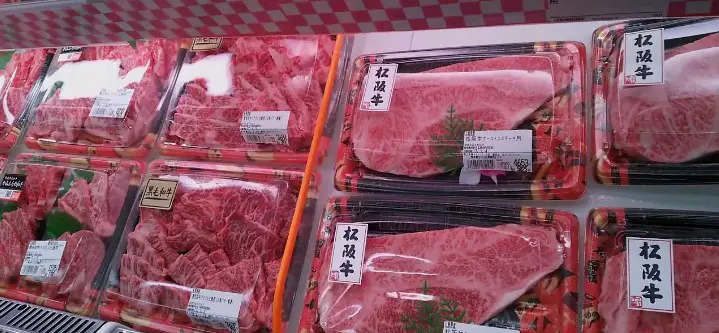Originally posted on June 20, 2022 @ 6:03 am
There’s a lot of debate surrounding wagyu beef. Some people say that it’s too fatty and tough to eat raw, while others insist that it’s the best way to enjoy its flavor. So, can you eat wagyu raw? In this post, we’ll explore the pros and cons of eating this luxurious meat in its raw form and help you decide whether or not it’s right for you.
Table of Contents
What Is Wagyu Raw?
Wagyu raw is a type of raw beef that is typically produced in Japan. The term “Wagyu” actually refers to any of the four Japanese breeds of cattle, which are known for their high-quality meat. This beef is often considered to be some of the best in the world, and it is often used in sushi and sashimi.

Wagyu raw is typically very marbled, which means that it has a lot of fat running through it. This fat is what gives the beef its unique flavor and tenderness. Wagyu cattle are raised on a special diet of grain and soybeans, which helps to produce a high amount of marbling in their meat.
Can You Eat Wagyu Raw?
While Wagyu beef is generally safe to eat raw, there are a few things to keep in mind. First of all, it is important to choose a high-quality cut of meat from a reputable source. This will help to ensure that the meat is fresh and free of any harmful bacteria.
Additionally, be sure to thoroughly wash your hands and all utensils that come into contact with the raw meat. When preparing Wagyu beef tartare or carpaccio, it is best to use a sharp knife to thinly slice the meat. This will help to prevent the spread of any bacteria that may be on the surface of the meat.
Additionally, be sure to serve the Wagyu raw immediately after it has been sliced. Once the Wagyu has been exposed to air for too long, it can begin to develop bacteria.
How To Choose Wagyu Raw?
When it comes to choosing Wagyu raw, there are a few factors you’ll want to consider. Here are some of the most important:

- The quality of the meat
There are four grades of Wagyu Beef: A5, A4, A3, and A2. The highest quality and most expensive Wagyu is A5. It has the most marbling and is the most tender. The higher the grade, the more marbling there will be in the meat, which means it will be more tender and flavorful.
2. The price
Wagyu can be quite expensive, so you’ll want to make sure you’re getting the best value for your money. There are a few ways to do this, such as buying in bulk or finding a retailer that offers discounts for purchasing multiple cuts of meat.
3. The source
The third factor to consider is the source. You want to make sure that you are buying Wagyu from a reputable source. The best way to do this is to look for a company that is certified by the Japanese Ministry of Agriculture, Forestry, and Fisheries. This will ensure that you are getting Wagyu that is raised in the best possible conditions.
4. The cut
The second factor to consider when you are looking at quality is the cuts of meat. You want to make sure that you are getting the best cuts of Wagyu. Looking at the label is the best way to do this. It should say something like “Wagyu Beef,” “Wagyu Steaks,” or “Wagyu Ribs.” If it just says “beef,” then you are not getting the best possible product.
5. The marbling
When it comes to marbling, there are three main types of Wagyu cattle: Black, Red, and Shorthorn. Each type has its own unique marbling patterns and fat content.
- Black Wagyu cattle are the most popular type of Wagyu in Japan. They have a high percentage of monounsaturated fats, which makes their meat extremely tender and flavorful.
- Red Wagyu cattle are the second most popular type of Wagyu in Japan. They have a lower percentage of monounsaturated fats than Black Wagyu, but their meat is still very tender and flavorful.
- Shorthorn Wagyu cattle are the least popular type of Wagyu in Japan. They have the highest percentage of saturated fats, which makes their meat less tender and flavorful.
How To Prepare Wagyu Raw?
There are a few things to keep in mind when preparing Wagyu beef.
- First, because of its high-fat content, Wagyu beef should be cooked slowly over low heat. This will help render out the fat and prevent the meat from becoming tough.
- Second, Wagyu beef is best enjoyed rare or medium-rare; cooking it any further will result in dry, tough meat.
- Finally, because of its rich flavor, Wagyu beef pairs well with simple seasonings and sides that won’t overpower the taste of the meat.
When you’re ready to cook your Wagyu beef, start by seasoning it with salt and pepper. Then, heat a skillet or grill pan over low heat. Add the beef to the pan and cook it slowly, turning it every few minutes, until it reaches the desired level of doneness. Once the beef is cooked, remove it from the pan and let it rest for a few minutes before slicing and serving.
What Are The Benefits Of Wagyu Raw?
When it comes to enjoying the unique flavor and texture of wagyu beef, many people prefer to eat it raw. This is because raw wagyu beef has a number of benefits that are not found in other types of beef.
- Increased nutrient absorption
When meat is cooked, the process of denaturing proteins can make some of the nutrients less bioavailable. However, when meat is consumed raw, these nutrients are more easily absorbed by the body.
2. Improved digestion
Raw meat is easier for the body to break down and digest, due to the lack of denatured proteins. This can lead to improved gut health and regularity.
3. Increased omega-3 fatty acids
Wagyu beef is high in omega-3 fatty acids, which have numerous health benefits, including reducing inflammation and promoting heart health.
4. Increased CLA levels
CLA is a type of fatty acid that has been linked to a variety of health benefits, including weight loss and reduced inflammation. Wagyu beef is one of the best sources of CLA.
5. Better flavor
Many people believe that raw meat has a more intense flavor than cooked meat. This is due to the fact that cooking can cause the loss of some of the meat’s natural flavor compounds.
Potential Dangers Of Eating Wagyu Raw
As delicious as it may be, there are certain risks associated with eating Wagyu raw. The most significant dangers include:
Pathogenic bacteria
Raw meat can harbor harmful bacteria that can cause food poisoning. These bacteria can often survive the cooking process, so it’s important to handle and cook raw meat properly to avoid contamination.
Parasites
Raw meat can also be contaminated with parasites, which can cause serious illness. These parasites are usually killed by cooking, but there is still a risk of infection if the meat is not cooked properly.
Allergens
Some people may be allergic to Wagyu meat, which can cause a range of symptoms including hives, swelling, and difficulty breathing. If you’re allergic to Wagyu, it’s important to avoid eating it raw.
Where To Buy Safe Wagyu Raw?

With all of that in mind, here are a few of the best places to buy Wagyu beef:
- Whole Foods Market
Whole Foods Market sells a variety of Wagyu beef products, including ground beef, steaks, and roasts. All of the Wagyu beef sold at Whole Foods Market is certified by the Japanese Ministry of Agriculture and comes from Japanese Black cattle raised in Kobe, Japan.
2. Sur La Table
Sur La Table is a kitchenware retailer that also sells a variety of Wagyu beef products, including steaks, burgers, and meatballs. The Wagyu beef sold at Sur La Table is certified by the Japanese Ministry of Agriculture and comes from Japanese Black cattle raised in Kagoshima, Japan.
3. D’Artagnan
D’Artagnan is a purveyor of gourmet foods, including Wagyu beef. The Wagyu beef sold by D’Artagnan is certified by the Japanese Ministry of Agriculture and comes from Japanese Black cattle raised in Kagoshima, Japan.
4. Omaha Steaks
Omaha Steaks is a retailer that specializes in selling steak products, including Wagyu beef. The Wagyu beef sold by Omaha Steaks is certified by the Japanese Ministry of Agriculture and comes from Japanese Black cattle raised in Kobe, Japan.
5. Snake River Farms
Located in Idaho, Snake River Farms produces some of the finest Wagyu beef in the country. Their cows are raised on a diet of alfalfa hay and grain, resulting in richly marbled and flavorful meat.
6. Cherry Valley Dairy
Cherry Valley Dairy is a Pennsylvania-based firm that specializes in Wagyu beef. Their cows are grass-fed and finished on a diet of corn and soybeans, yielding beautiful marbling and great flavor.
7. Broadleaf Ranch
Broadleaf Ranch is located in Colorado and proudly offers its Wagyu beef to the public. The cattle at Broadleaf Ranch are 100% grass-fed, ensuring that the beef is healthy and delicious.
What Do Wagyu and Kobe Beef Have The Differences?
Wagyu cattle are a Japanese breed that is known for its marbled meat. This marbling occurs when there is an abundance of intramuscular fat, which gives the meat its characteristic flavor and tenderness. Wagyu beef is prized for its melt-in-your-mouth texture and rich flavor.
Kobe beef comes from a specific strain of Wagyu cattle that are raised in the Kobe region of Japan. Kobe beef is known for its intense marbling, which results in a higher fat content than other types of Wagyu beef. Kobe beef is also renowned for its flavor, which is said to be more intense than other kinds of Wagyu beef.
Nutritional Information In Wagyu Raw
There are many factors to consider when choosing the right Wagyu raw for your needs. One important factor is the nutritional content of the meat. Here is a closer look at the nutritional information in Wagyu raw:
#Protein
Wagyu beef is an excellent source of protein. A four-ounce serving of Wagyu beef contains approximately 26 grams of protein. This is an important nutrient for those who are looking to build muscle or lose weight.
#Iron
Wagyu beef is also a good source of iron. Iron is required for the formation of hemoglobin, which transports oxygen throughout the body. A four-ounce serving of Wagyu beef contains approximately 3 milligrams of iron.
#Zinc
Wagyu beef is also a good source of zinc. Zinc is required for the immune system to operate properly. A four-ounce serving of Wagyu beef contains approximately 3 milligrams of zinc.
#Magnesium
Wagyu beef is also a good source of magnesium. Magnesium is required for the neurological system to function properly. A four-ounce serving of Wagyu beef contains approximately 24 milligrams of magnesium.
FAQs About Can You Eat Wagyu Raw
Refer to the commonly asked questions below to find out if can you eat Wagyu raw?.
- How should I store wagyu beef?
Wagyu beef should be stored in the refrigerator or freezer. If you plan on eating the wagyu raw, we recommend storing it in the refrigerator for up to 3 days. If you plan on cooking the wagyu, it can be stored in the freezer for up to 6 months.
2. What is the best way to cook Wagyu beef?
Wagyu beef can be cooked using any method, but we recommend cooking it low and slow to preserve its flavor and tenderness. Wagyu beef is often served as steak, but can also be used in dishes like stews or stir-fries.
3. How much Wagyu beef should I eat?
Most people can safely consume up to 8 ounces of wagyu beef per week. However, if you are concerned about your cholesterol or fat intake, we recommend consuming no more than 4 ounces per week.
4. What does Wagyu beef taste like?
Wagyu beef has a rich, buttery flavor with a tender, melt-in-your-mouth texture. The high-fat content of Wagyu beef also gives it unique juiciness that is unlike any other type of beef.
5. Is Wagyu beef healthy?
Wagyu beef is actually quite healthy, despite its high-fat content. This is because Wagyu beef contains a higher percentage of monounsaturated fatty acids, which are considered to be “good” fats. Additionally, Wagyu beef is a great source of protein and other nutrients.
Conclusion – Can You Eat Wagyu Raw
While Wagyu beef is considered a delicacy by some, it can be eaten raw. The key to doing so safely is ensuring that the beef is of the highest quality and has been handled and processed properly. If you are interested in eating Wagyu beef raw, do your research first and make sure you know where to find safe, high-quality meat. With a little caution, you can know valuable information on can you eat Wagyu raw and can enjoy this luxurious cut of meat any way you like!
See also:
Leave a Reply